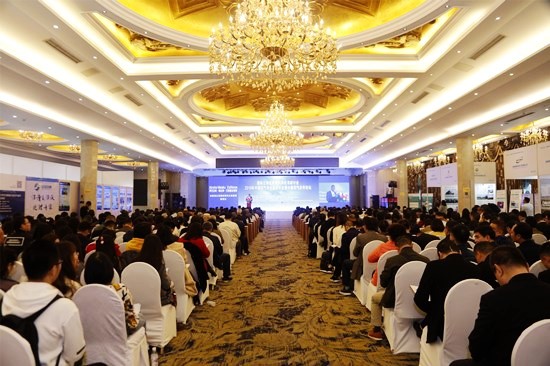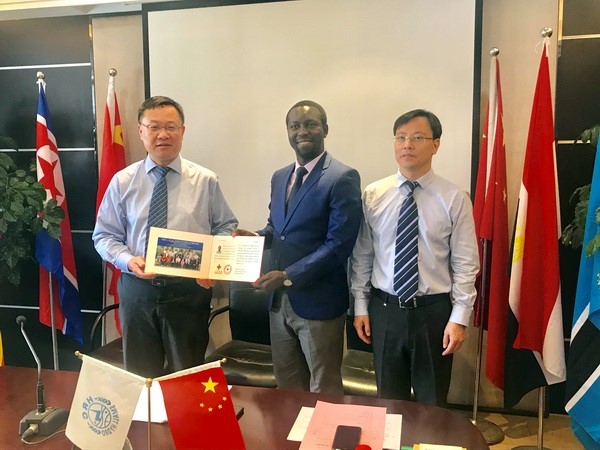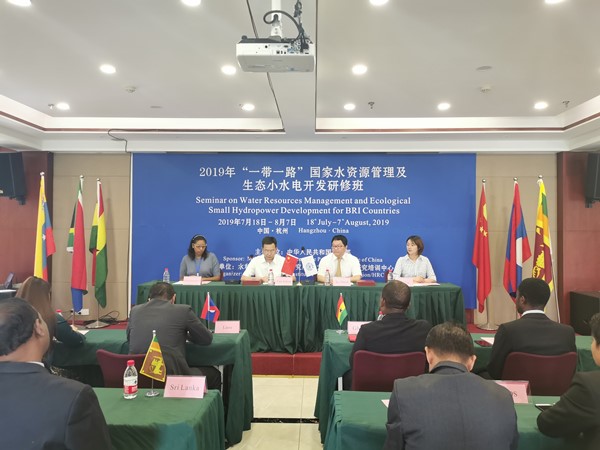6.Taking a lead in reforming and developing the global governance system
It is the common aspiration of countries around the world to make global governance fairer and more equitable, and fulfill the principles of extensive consultation, joint contribution and shared benefits. As a major and responsible country, China will continue to enjoy its rights in balance with fulfilling its obligations, taking account of both its requirements of the world and the international community's expectations for China. We will take an active part in reforming and developing the global governance system. As a participant in, builder of, and contributor to that system,
best suits the world, and best suits the peoples of all countries? China advocates that it should be decided by all countries through consultation, and not by a single country or a small minority of countries. We will play an active role, strengthen coordination with all parties concerned, and promote peace, development, equity, justice, democracy, freedom and other common human values, making the global governance system better reflect changes to the international architecture and the will of the international community in a more balanced way.
China gives active support to reforming the UN, helping it better meet the new requirements of global governance in its
and open, improve settlement mechanisms for trade disputes, and play a bigger role in developing an open and inclusive world economy. China will work with the international community to address global issues including climate change, terrorism, cyber security, energy security and severe natural disasters, and jointly protect our home planet.
China makes active efforts to advance the quota and governance reform of the IMF and the World Bank, better reflecting changes to the international architecture. We will promote the role of the G20 as the premier forum for international economic cooperation, and help it transform from a crisis-management body to a long-term

New Era, Shared Future
By Andrew Moody
China hopes to help the system move with the times through innovation and improvement, rather than reinvent the wheel.
This is a common cause of all countries and regions, so we must pursue the transformation of the global governance system by following the principles of extensive consultation, joint contribution and shared benefits. We must endeavor to turn sound proposals into consensus and concerted actions. What kind of international order and governance system
underlying guidelines, organization and operations, better fulfill the responsibilities prescribed in the UN Charter, and better play an expanding role in safeguarding world peace and promoting common development. We support necessary reform of the WTO on the basis of equity and justice. China advocates that reform of the WTO should safeguard its core values and basic principles, especially the interests and policy space of developing countries. The WTO should promote trade liberalization and facilitation to make global trade more regulated, accessible
and effective governance mechanism, making a bigger contribution to world economic growth and global economic governance. In leading and promoting an open world economy, China will push for new breakthroughs in the Asia-Pacific Economic Cooperation (APEC), and ensure that more people embrace the spirit of an Asia-Pacific family and the idea of a community of shared future. We will ensure sustained and steady progress of the BRICS cooperation mechanism, so that it can play a greater role among international platforms.
We will actively promote innovative ideas in global governance, sum up the successful practice and experience of national governance, and explore values in our cultural tradition that remain relevant today as positive guides for good relations, trying to contribute Chinese wisdom, solutions and strength to global governance.
Source: White Paper: China and the World
in the New Era, Xinhua Net
Xi's commitment to eradicating poverty is seen as a role model throughout the developing world
China in its New Era has an increasingly significant role on the world stage as it marks the 70th anniversary of the founding of the People's Republic.
Its landmark initiatives such as Belt and Road and the establishment of the Asian Infrastructure Investment Bank are set to have a profound effect on global infrastructure.
Chinese President Xi Jinping has also been a strong champion of the benefits of globalization as set out in his landmark address to the World Economic Forum in Davos in January 2017.
His overarching philosophy for global cohesion is his concept of "a community with a shared future for mankind" with countries working together to find solutions to global problems.
As such, China has played a leading role in bodies such as the G20, hosting the summit in Hangzhou in September 2016; BRICS, staging its 9th summit in Xiamen in September 2017; and the Forum on China-Africa Cooperation with Beijing welcoming African leaders for the organization's third summit in September 2018.
Xi's commitment to eradicating poverty is seen as a role model throughout the developing world.
By the end of next year, the government is committed to ending extreme poverty in China in time for the 100th anniversary of the founding of the Communist Party of China in 2021 when the country aims to be "a moderately prosperous" society.
China also aims to set the agenda on climate change with environmental technology set to become one of its flagship industries and with the goal also set by Xi of achieving a "Beautiful China" by 2035.
Martin Jacques, the British academic and author of When China Rules The World, one of the most influential books on China in recent times, believes the 70th anniversary comes at a time when China in its New Era is playing a much more global role.
"China is now firmly playing on the global stage and providing global leadership with quite a lot of success," he says.
"It i s now a for m i da b l e p l a ye r , economically but also increasingly politically, morally and ethically, too, and that is a very big change from before."
Rana Mitter, director of the University of Oxford China Centre, believes one area where China could now make a major contribution as it marks its anniversary is on climate change, particularly with its 2035 target to clean up its own environment.
"This is where the world expects China to provide a clear big role and it is an area in which its global reputation will be tested. People very much want China to play that role," he says.
"It has made major strides in addressing the climate change challenge by investing in technology. It is also the case because of the sheer weight of its own carbon burden that it is also incumbent on China to make a particular effort. If it were to become the greenest economy in the world that would be something of huge historical significance."
Wang Huiyao, founder and president of the Center for China and Globalization, the Beijing-based independent think tank, says the anniversary comes at a time when China's economic and cultural soft power are at an all time high.
"This is why the thinking behind the New Era is so important. China has to reposition itself in terms of dealing with the rest of the world. The emphasis of a shared future for mankind where there are shared interests, prosperity and responsibility is the right course of action," he says.
Wang, who is also a counselor to the State Council, China's cabinet, insists the thinking is not just theory but something of substance.
"It is certainly not a slogan. You only have to look at the Belt and Road Initiative, which is set to be absolutely transformative in terms of filling the infrastructure gap around the world," he said.
Jin Keyu, associate professor at the London School of Economics, says one thing that is striking as China celebrates its anniversary is the extent to which Chinese people have confidence in their own
government, which is in marked contrast to their counterparts in the West.

"That is the critical difference between China and the rest of the world.," she says. Jin says this is a particularly important in China's New Era under President Xi Jinping who has put particular emphasis on the Chinese political system delivering results for the "grassroots and the masses". She says that in the West, governments are not seen as important actors with their credibility weakened further by falling living standards after the global financial crisis.
"People are against big government. They are against the notion of State intervention. This was not the case in the past where there was massive use of State capacity such as the post-war Marshall Plan. The role of the State also formed the thinking of founding fathers of the United States such as Alexander Hamilton."
Kishore Mahbubani, distinguished fellow at Asia Research Institute, National University of Singapore, says President Xi has had made it clear the anniversary was not about China resting on its laurels.
The former diplomat says that Xi's speech in Jiangxi province in May when he said the Chinese must prepare for a new Long March was indicative of that. The first Long March between 1934 and 1936 laid
the foundation for the Party's eventual victory over the Kuomintang in 1949 and the formation of New China.
"The Chinese will want to concentrate on their celebrations but at the same time they are facing great challenges.
"The metaphor of the Long March is very appropriate because we are approaching a more difficult economic environment with global growth slowing, incomes not likely to rise as fast and an altogether different and more difficult environment."
Mahbubani, also author of Has the West Lost It? A Provocation, says some of the headwinds have been created by the current trade conflict with the US, which he believes would ultimately be against Washington's long term-interests.
"You have a situation where the US is walking away from a wonderful multilateral order it built in 1945, which was its gift to the world. The good news is that the Europeans want to save this order and China can work with Europe."
Mahbubani believes that Xi is right to place emphasis in the New Era in engaging with the developing world, particularly Africa.
"China is right to continue to engage Africa because there are many opportunities for growth there and it is a natural partnership. "Europe, in particular, hasn't woken up to the demographic explosion that is about to occur there (forecasts suggest Africa's population will triple from now to 4.3 billion by 2100) and are not thinking strategically about its development."
Bukola Ogunsina, editor of the Sunday
edition of the Leadership newspaper in Nigeria and a prominent African journalist, is one who concurs with this.
She says initiatives such as Belt and Road and the Forum on China-Africa Cooperation, which has held two major summits under Xi's period of office, has had a significant impact on the continent.
"We can say that through the benefits brought about by these programs, roads have been constructed, rail transportation developed with others under construction." She says Chinese investment and knowhow have had a dramatic impact on Nigeria - Africa's largest economy - alone. She cites, in particular, the Abuja Light Rail and the Abuja-Kaduna Rail Line, which have been major Chinese projects in the country.
"Nigeria is taking the development of its transport system seriously because China has shown that it can be done."
Ogunsina says there has also been emphasis on training local people. The National Agency for Science and Engineering Infrastructure (NASENI) in Nigeria sent 60 engineers to China for training, 85 percent of the funding being provided by China.
"In terms of people-to-people exchanges it's a good collaboration," she says.
One area where China has transformed over the past 70 years is in technology - emerging from being a backward agrarian society to the prospect of being a global leader in technology by 2035, one of the aims of New Era.
Edward Tse, founder and CEO of Gao Feng Advisory, the management
consultancy, believes this is certainly achievable.
"Looking 16 years ahead you can make a number of predictions as to what China is going to achieve in its New Era and you are talking about it becoming a leader in disruptive technologies like Internet of Things, artificial intelligence and also, of course, in 5G, where it has already established a lead."
Tse, also author of China's Disruptors: How Alibaba, Xiaomi, Tencent, and Other Companies are Changing the Rules of Business, says the strength of China's technology effort is how the central government is driving it from the top down.
"Local governments then become the glue to central government directions, incubating start-ups and giving them funding and creating this vast eco system, which also includes waves and waves of talented entrepreneurs.
"You have got no other country operating like this. Yet you have this paradox where the West still thinks their way is the only way."
Parag Khanna, an international relations specialist and author of The Future is Asian: Global Order in the 21st Century, says what is increasingly impressive is the delivery of the State.
"What you see is this growing confidence in its government capacity. You have seen this over the past 10 to 15 years but particularly over the past five. This has happened while Western countries have turned inward and become more protectionist," he says.
Jin at LSE believes that Xi with the New Era has brought a new dimension to China's role in the world.
"Before the New Era, China's story (since reform and opening-up) was largely seen as an economic one. China now is much more clearly defined. The primacy of culture and national sovereignty has become much more clearly defined," she says.
"What is also important is the capacity of the State to make people's lives better and unabashedly embracing of that concept." Wang at CCG believes China is now playing a role in the world that could not have been imagined in 1949.
"It is a country with a strong position on the world stage and which has led the way in so many areas, such as poverty reduction.
"In its New Era, it has a new confidence. It has demonstrated a commitment to globalization and wants to engage and partner with countries in a constructive but respectful manner."







